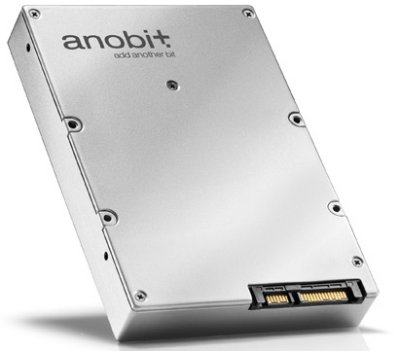
Posted on Wednesday, June 16 2010 @ 21:33 CEST by Thomas De Maesschalck
Israeli storage startup Anobit Technologies presented Genesis, a new solid state disk that uses a Memory Signal Processor (MSP) to boost MLC NAND flash memory reliability. The company says its Genesis SSD has an endurance rating of over 50,000 cycles, a 20x improvement compared to regular MLC NAND flash memory disks, making it a low-cost alternative to SLC-based enterprise SSDs. The Genesis SSD will be available in 200GB and 400GB capacities and promises read speeds of up to 220MB/s, write speeds of 180MB/s, 30,000 IOPS random read and 20,000 IOPS random write.
Anobit today unveiled its solid state drive (SSD) product portfolio - the Anobit Genesis SSD series - the first multi-level cell (MLC) solid state drive family to deliver true enterprise-class reliability and performance for datacenter storage and server infrastructure. Anobit Genesis SSDs utilize Anobit's patented Memory Signal Processing (MSP™) technology to achieve an unparalleled write endurance rating of over 50,000 cycles using standard low cost MLC, enabling enterprise-class SSD storage at a fraction of the cost of today's single-level cell (SLC) SSDs. Thousands of Anobit Genesis SSDs are being distributed to OEMs for qualification.
Unrivaled, enterprise-class MLC SSD reliability. Based on proprietary algorithms that compensate for the physical limitations of NAND flash, Anobit's MSP technology extends standard MLC endurance from approximately 3K read/write cycles to over 50K cycles - a 20X improvement - to make MLC technology suitable for high-duty cycle applications.
Optimized for datacenter environments. Anobit's Genesis SSD portfolio leverages Anobit's MSP technology to bridge the endurance gap between MLC SSDs and expensive SLC SSDs, eliminating the cost barriers that have impeded widespread SSD adoption in enterprise storage arrays and servers. Where the effectiveness of competing compression-based MLC SSD technologies is compromised in some use cases (ex. encrypted or pre-compressed data), Anobit Genesis SSDs remove MLC endurance limitations at the NAND level to ensure over 50K write cycles for any data type or level of application performance. This guarantees drive write endurance of ten full disk writes per day, for five years, or 7,300 TBs for a 400 GB drive, with fully random data (worst-case conditions).
Solving the Density-Cost-Latency-Endurance paradox. SLC flash memory devices store a single bit of information in each memory cell, providing low latency and high write endurance cycle ratings, but compromised by high cost and low density. Conversely, MLC flash memory devices store two or more bits per memory cell, and therefore provide higher density and lower cost, but are compromised by high latency and far lower endurance. Anobit's MSP is the first technology to simultaneously achieve the low latencies and high endurance of SLC-based SSDs combined with the low cost and high density of MLC-based SSDs.
High-performance solid state storage. First-generation Anobit Genesis SSDs deliver 20,000 IOPS random write and 30,000 IOPS random read, with 180 MB/s sustained write and 220 MB/s sustained read. This performance profile ensures that Anobit Genesis SSDs are suitable for demanding, transaction-intensive applications, providing performance that is orders of magnitude greater than the performance offered by today's hard disk drives (HDDs).
Anobit MSP: Industry-proven technology. Some of the world's largest NAND manufacturers, consumer electronics vendors and storage solution providers currently utilize Anobit's MSP technology in their products.
Anobit leadership team. Comprised of academic and industry luminaries, Anobit brings together expertise spanning signal processing, coding and information theory, semiconductors, removable storage and system design.
"There's something of a reliability-and-cost 'Catch 22' obstructing the wider adoption of solid state storage in enterprises; the usage viability of enterprise SSDs is inextricably linked to the physical viability of their underlying NAND. While MLC NAND offers economics that can at least approach that of spinning storage, its endurance limits are still often a concern to SSD vendors and users alike," said Mark Peters, Senior Analyst, Enterprise Strategy Group. "Anobit's approach is to undo that Catch 22 by enabling enterprise-grade endurance to be delivered from low-cost commercial NAND, something that could help to accelerate the adoption of SSDs in datacenters, and something that positions Anobit well in the market."
"For too long, the high prices of SLC SSDs and concerns about MLC SSD endurance have slowed the adoption of flash memory storage in the enterprise. Anobit Genesis SSDs effectively neutralize both of these concerns," said Prof. Ehud Weinstein, Anobit CEO. "By delivering true enterprise-class SSD reliability at affordable MLC SSD prices, Anobit Genesis SSDs unlock the full promise of solid-state enterprise storage."
Anobit Genesis SSD Availability
Anobit Genesis SSDs are available today for OEM qualification, in 200GB and 400GB capacities.

